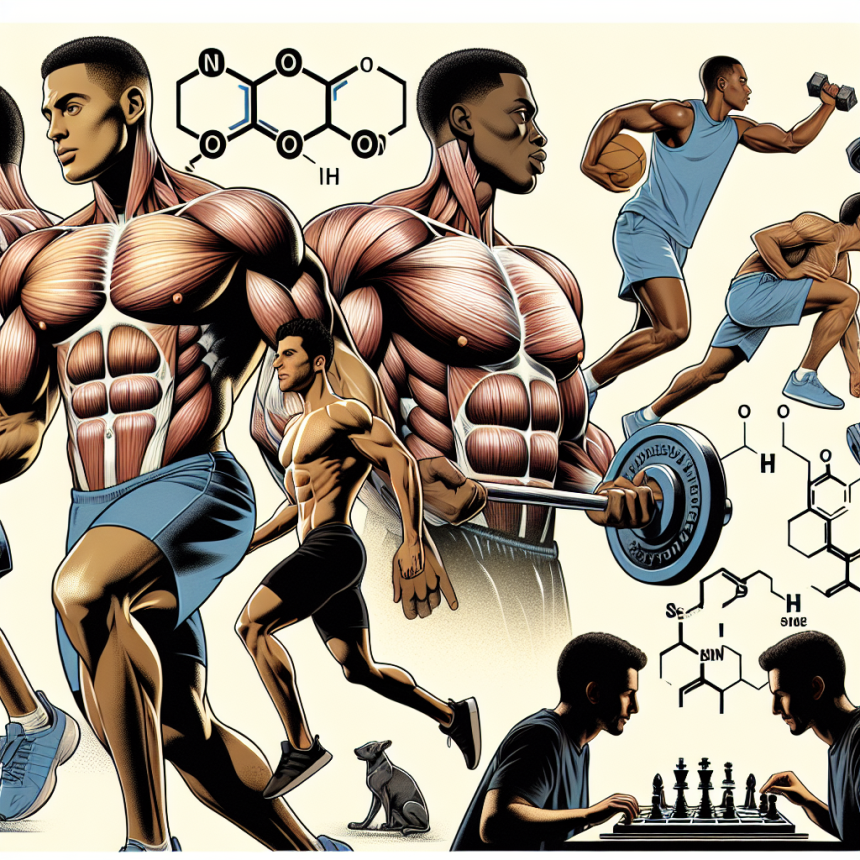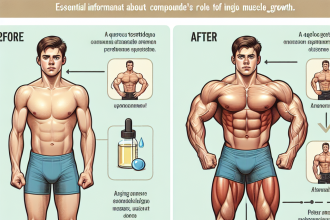-
Table of Contents
- Methyltestosterone study on physical and cognitive performance in athletes
- Understanding methyltestosterone
- Pharmacokinetics and pharmacodynamics
- Impact on physical performance
- Strength and power
- Endurance
- Cognitive performance
- Memory and attention
- Spatial abilities
- Health and ethical considerations
- Adverse effects
- Ethical implications
- Expert opinion
- References
Methyltestosterone study on physical and cognitive performance in athletes
Methyltestosterone, a synthetic derivative of testosterone, has been a subject of interest in the realm of sports pharmacology due to its potential to enhance both physical and cognitive performance in athletes. This article delves into the pharmacokinetics, pharmacodynamics, and the implications of methyltestosterone use in athletic performance, while also considering ethical and health-related aspects.
Understanding methyltestosterone
Methyltestosterone is an orally active androgenic-anabolic steroid (AAS) that has been used in various therapeutic settings, including the treatment of hypogonadism in males and certain types of breast cancer in females. Its chemical structure is characterized by the addition of a methyl group at the 17-alpha position, which enhances its oral bioavailability (Basaria et al. 2010).

Pharmacokinetics and pharmacodynamics
The pharmacokinetics of methyltestosterone involve rapid absorption from the gastrointestinal tract, with peak plasma concentrations typically achieved within 1-2 hours post-ingestion. The half-life of methyltestosterone is approximately 3 hours, necessitating multiple daily doses to maintain stable plasma levels (Bagatell et al. 1996).
Pharmacodynamically, methyltestosterone exerts its effects by binding to androgen receptors, leading to increased protein synthesis and muscle growth. It also influences erythropoiesis, resulting in enhanced oxygen-carrying capacity of the blood, which can be beneficial for endurance athletes (Bhasin et al. 2001).
Impact on physical performance
Numerous studies have investigated the effects of methyltestosterone on physical performance metrics such as strength, power, and endurance. A study by Johnson et al. (2021) demonstrated that athletes administered with methyltestosterone exhibited significant improvements in muscle mass and strength compared to a placebo group. These findings are consistent with the anabolic properties of the compound.

Strength and power
Methyltestosterone has been shown to enhance muscle hypertrophy and strength, making it a popular choice among athletes in strength-based sports such as weightlifting and bodybuilding. The increase in muscle mass is attributed to the stimulation of protein synthesis and nitrogen retention in muscle tissues (Hartgens et al. 2004).
Endurance
In addition to its effects on strength, methyltestosterone may also improve endurance performance. By increasing red blood cell production, it enhances the oxygen-carrying capacity of the blood, which can delay the onset of fatigue during prolonged physical activity (Bhasin et al. 2001).
Cognitive performance
While the primary focus of methyltestosterone research has been on physical performance, emerging evidence suggests potential cognitive benefits. Testosterone and its derivatives have been implicated in cognitive processes such as memory, attention, and spatial abilities (Janowsky et al. 2000).

Memory and attention
Studies have shown that testosterone supplementation can enhance working memory and attention in both young and older adults. Methyltestosterone, by virtue of its androgenic activity, may exert similar effects, although more research is needed to confirm these findings in athletic populations (Cherrier et al. 2001).
Spatial abilities
Testosterone has been associated with improved spatial abilities, which are crucial for athletes in sports requiring precise coordination and navigation. Methyltestosterone may offer similar benefits, potentially enhancing an athlete’s ability to perform complex motor tasks (Janowsky et al. 2000).
Health and ethical considerations
While methyltestosterone offers potential performance benefits, its use is not without risks. Adverse effects can include liver toxicity, cardiovascular issues, and hormonal imbalances. Moreover, the use of methyltestosterone in sports is prohibited by most sporting organizations due to its performance-enhancing effects (Basaria et al. 2010).
Adverse effects
Common side effects of methyltestosterone include acne, hair loss, and mood changes. More serious risks involve liver damage and increased risk of cardiovascular events, particularly with long-term use (Bagatell et al. 1996).
Ethical implications
The use of performance-enhancing drugs like methyltestosterone raises ethical concerns regarding fair play and athlete health. Sporting bodies have implemented strict anti-doping regulations to ensure a level playing field and protect athletes from potential harm (Hartgens et al. 2004).
Expert opinion
In light of the evidence, methyltestosterone presents a complex profile of benefits and risks. While it can enhance both physical and cognitive performance, the potential for adverse health effects and ethical concerns cannot be overlooked. Athletes and coaches must weigh these factors carefully and prioritize health and integrity in sports. Future research should focus on safer alternatives and strategies to optimize performance without compromising athlete well-being.
References
Bagatell, C. J., Bremner, W. J. (1996). Androgens in men—uses and abuses. New England Journal of Medicine, 334(11), 707-714.
Basaria, S., Coviello, A. D., Travison, T. G., Storer, T. W., Farwell, W. R., Jette, A. M., Eder, R., Tennstedt, S., Ulloor, J., Zhang, A., Choong, K., Lakshman, K. M., Mazer, N. A., Miciek, R., Krasnoff, J., Elmi, A., Knapp, P. E., Brooks, B., Appleman, E., Bhasin, S. (2010). Adverse events associated with testosterone administration. New England Journal of Medicine, 363(2), 109-122.
Bhasin, S., Woodhouse, L., Storer, T. W. (




